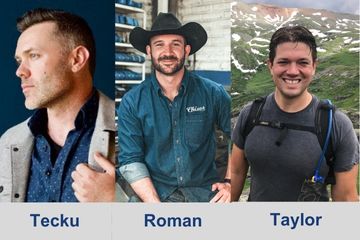By late 2023 Aaron Powell had become disillusioned with Bunch Bikes, the electric cargo bicycle company he founded in 2017. Costs were rising, cash was scarce, and the supply chain was chaotic.
He contemplated chucking it all, selling the business, and moving his family to Europe from his base in Texas.
Then he reconsidered. Bunch Bikes had many positives, including a sense of purpose from improving customers’ lives. So he stayed.
Aaron first appeared on the podcast two years ago. In this latest conversation, he addressed business uncertainty, resilience, family, and more. Our entire audio is embedded below. The transcript is condensed and edited for clarity.
Eric Bandholz: Who are you, and what do you do?
Aaron Powell: I’m the founder and CEO of Bunch Bikes, an electric family cargo bike company based in Texas. Think of it as the minivan of bikes. It carries pets, groceries, and up to six kids, all with electric assistance and a fun, smooth ride.
I first saw the concept in Copenhagen in 2012. Cargo bikes are hugely popular in Denmark, Sweden, and the Netherlands, where cycling is central to daily life.
Here in the U.S., far fewer people use bikes for everyday transport, but the potential market is enormous given the population. Awareness of cargo bikes remains low, even within the industry.
Running a bike company over the past few years has been intense with the pandemic and supply chain chaos. By late 2023, my wife and I were reevaluating our lives. We wondered if we’d be happier living elsewhere and began planning a move to the Netherlands. We spent months exploring cities, hiring an immigration lawyer, and figuring out logistics.
During the process, we realized that moving would mean leaving behind friends, family, and community. Our network here in Texas is meaningful. Starting over in a new country, always feeling culturally out of place, didn’t feel worth it.
We decided to stay and focus on making the most of our current life.
Bandholz: You alluded to the business challenges. Did you consider selling the company?
Powell: Yes. I nearly sold it when contemplating the move. We went through the steps of finding a buyer, completing due diligence, and planning the close. I was motivated by fear of uncertainty and market changes.
But the process made me see the positives. We were acquiring customers without running ads, referrals were strong, and our brand equity was driving sales. My team is rock solid — competent, trustworthy, and experienced. I can step away, and the business runs smoothly. That made me question why I’d sell something so well-established.
I’ve found that true value comes from building something meaningful that impacts others. Starting over from scratch doesn’t excite me. Appreciating what we have now has made me excited to tackle new challenges. Demand for our products remains strong. People still want bikes, so why not trust that there’s a path forward and focus on what we already built?
Bandholz: Was your team aware you were considering selling the business?
Powell: No, they weren’t. I didn’t want to spook anyone; employees naturally worry about job security. During the process, it was important to keep operations steady and minimize disruption. I’m usually transparent, but not in this case. Afterward, I debriefed them, revealing that I almost sold, but didn’t, and why.
Their response was impressive. They stepped up, took on responsibilities I usually handle, and kept the business functioning without issues. It made me appreciate their capabilities and commitment even more.
In hindsight, I could have shared some of this context sooner, but the debrief built deeper trust.
Bandholz: How do you balance business risk with the ability to adapt?
Powell: I thrive when I’m constrained. Clear, specific problems trigger my creativity. Open-ended situations, where anything is possible, are more challenging for me.
For example, when tariffs increased recently, I became an idea machine, exploring every solution. I didn’t panic. That mindset helps me focus on actionable steps rather than fear.
Looking ahead, I anticipate sales slowing or retail prices becoming unsustainable. I’m tackling it by reducing debt and increasing cash. One approach is to tap our loyal customers through a Wefunder equity raise. I’d rather give up some ownership now to secure financial flexibility.
Having cash on hand gives me time to solve problems. Plus, it’s extra capital to grow the business. The key is to act proactively, turning uncertainty into a problem-solving opportunity rather than letting fear freeze you.
My first ecommerce business was selling kids’ jewelry on Amazon. I realized making money alone wasn’t fulfilling. I wanted purpose and meaning. I was working minimal hours, but it didn’t feel impactful.
When I started Bunch Bikes, I intentionally built something more complicated, capital-intensive, and slow to scale — but deeply meaningful. Improving our customers’ lives makes all the effort worth it.
Bandholz: Where can people follow you, buy the minivan of bikes?
Powell: Our site is Bunchbike.com. I’m on X and LinkedIn.





